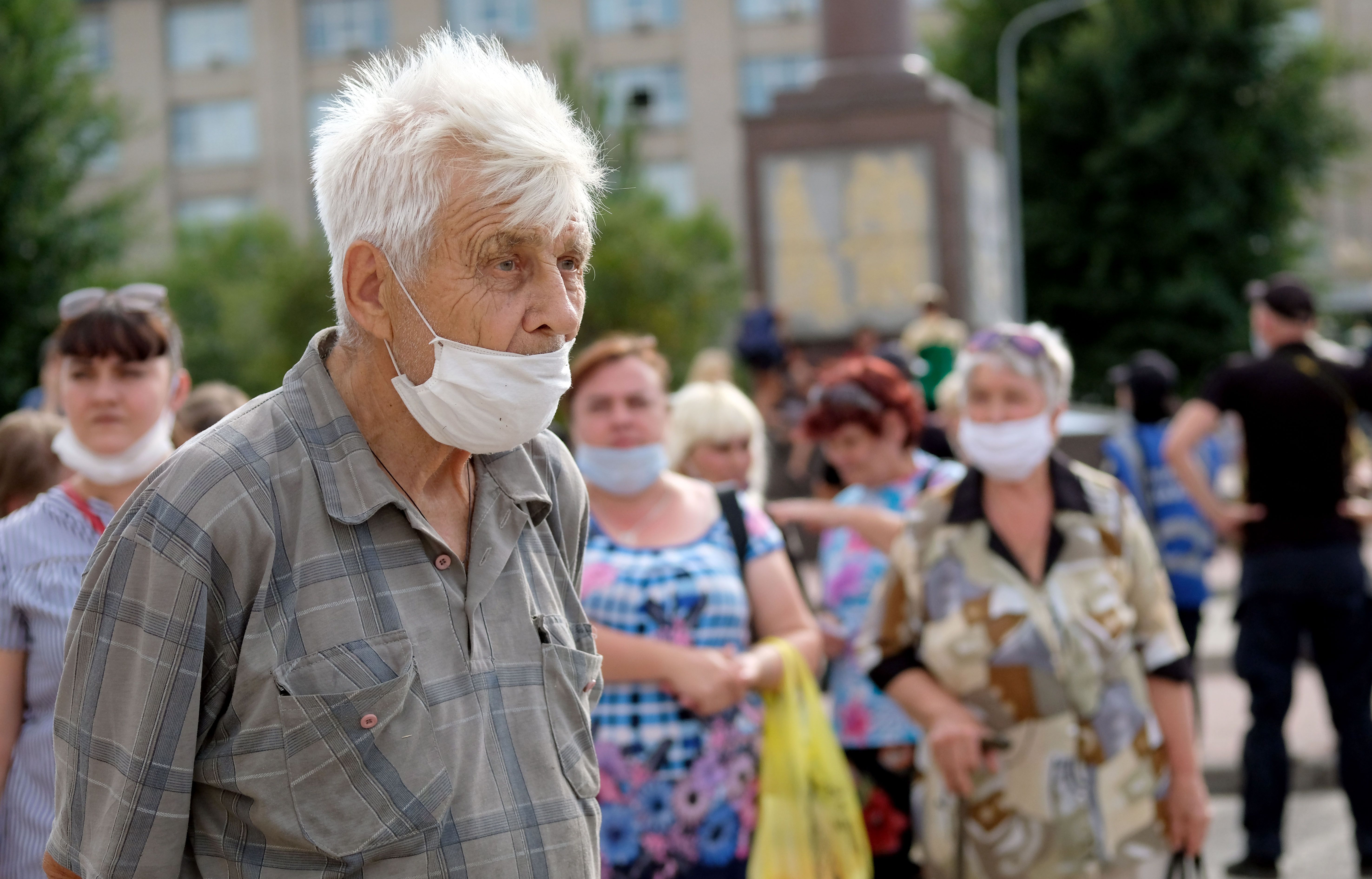Donbas: Mired in Crises

Socio-Demographic Situation
After Russia’s military aggression against Ukraine began in 2014, parts of the Donetsk and Luhansk oblasts fell beyond the control of the Ukrainian authorities. These areas constitute 2.6% of the country’s territory and, according to estimates by the State Statistics Service of Ukraine, in 2014 were inhabited by 3.9 million people (about 8.6% of the country’s population). The military conflict that has killed about 13,000 people, including more than 3,300 civilians, has forced population movement and changes in the social structure. The Ukrainian Ministry of Social Policy has registered nearly 1.5 million refugees from Donbas, although at least a third still live in the occupied territories. These people are mainly elderly, for whom registration in areas still controlled by the Ukrainian government was a condition for receiving Ukrainian pensions. Some Donbas residents left for Russia—in 2016, the Russian authorities reported about 1.2 million Ukrainians had arrived as a result of the conflict. Most of them were economic migrants. In the last year, migration to Russia was facilitated by the Russian authorities, who granted “citizens” of the so-called republics access to a simplified procedure for obtaining Russian citizenship. By November this year, 300,000 Russian passports were reportedly granted. Independent estimates currently indicate 2-2.5 million people still living in the Russian-controlled enclaves, although the exact number is unknown. The self-proclaimed authorities in Donbas have yet to announce the results of the census carried out in October 2019, most likely because of a significant decline in the population.
The “republics” are characterised by negative demographic processes: lower rates of natural increases than other parts of Ukraine and an increase in the percentage of elderly people. Estimates by Ukrainian and international organisations monitoring the situation in Donbas indicate that people over 60 years of age constitute about 28–36% of the local population while in other regions of Ukraine this percentage is 24%. There is no reliable data on the scale of unemployment, but many enterprises, including many mines, which were once the main sources of employment, have ceased to function, and those still operating have problems with paying wages. According to data provided by the authorities of the “republics”, the average salary in 2019 was the equivalent of about EUR 96-125, which is less than 50% of the average earnings in the Ukrainian-controlled parts of Luhansk and Donetsk regions. Estimates by the United Nations Office for the Coordination of Humanitarian Affairs indicate that at least 1.9 million people living in occupied Donbas are in need of humanitarian support (including food products, drinking water, medical care, sanitation, and hygiene products). The economic situation is further aggravated by the Ukrainian trade blockade, in place since 2017.
Everyday life is hindered by infrastructure damaged during the war. Even though the intensity of frontline fighting in the Donbas has decreased in recent months, sporadic shelling continues, with civilian objects damaged. From January to August this year, the Office of the UN High Commissioner for Human Rights (OHCHR) recorded 75 such incidents in which educational institutions (schools and kindergartens), water and sewerage infrastructure, and other civilian infrastructure were damaged.
The Actions of the Occupying Authorities
The self-proclaimed authorities in Donbas are trying to create a local identity for the region based on the idea of the “Russian world” (russkij mir) and at the same time are pursuing an anti-Ukrainian ideological policy. The purpose of their activities is to further isolate the occupied territories and people living there from Ukraine. For example, in March, the authorities stripped state language status from Ukrainian. One of the main instruments of de-Ukrainisation is the school system. Education in the Russia-controlled territories is based on Russian textbooks, and the curriculum includes “Donbas citizenship and spirituality lessons”. This will make it more difficult for students in these areas to take up further education at Ukrainian universities, despite special programmes supporting youth from the occupied territories.
People who disagree with the occupying authorities are subject to repression. The OHCHR points to the reintroduction of the death penalty and unlawful detention by local security services. Political prisoners are subjected to torture, and international organisations, including the Red Cross (ICRC), have limited access to them.
The activities of the authorities of the so-called republics also extend to the religious sphere. The Orthodox Church of Ukraine of the Moscow Patriarchate, openly supporting Russian military operations in Ukraine, is recognised as the only state church. This has led to attacks on other church communities, prohibitions or obstruction of religious practices, as well as arrests of believers and clergy, along with cases of torture. Most of all, adherents of the Greek Catholic Church, the autocephalous Orthodox Church of Ukraine, and Jehovah’s Witnesses are persecuted.
Consequences of the COVID-19 Pandemic
There is no reliable information on the number of infections in the occupied territories. The Ukrainian Ombudsman’s office said hospitals in these areas were overcrowded and pharmacies lack personal protective equipment and medicines. The high proportion of older people in the occupied territories and the low level of healthcare are likely to have been conducive to the rapid spread of the pandemic, although the isolation of these territories may be a factor preventing infections to some extent. A reliable assessment of the situation and support for the population has been hindered by the policy of the self-proclaimed authorities towards international humanitarian aid. Since the beginning of the pandemic to September, only a few ICRC convoys or convoys from Russia have been allowed in. However, there is no data on the type of Russian aid, and the Ukrainian side accuses Russia of giving military equipment to the so-called republics under cover of humanitarian aid.
From the end of March to mid-June, the authorities of the so-called republics practically blocked the possibility of crossing the line of contact separating the occupied territories from the rest of Ukraine. Due to the blockade, many people lost access to social and humanitarian aid, healthcare, and jobs. Local pensioners who could not collect their Ukrainian pension found themselves in a difficult situation. Despite the conditional opening of crossings on the contact line, passenger traffic is still severely limited (from mid-June to the end of July, a total of about 43,000 crossings were recorded in both directions, compared to about 1.3 million crossings a month before the outbreak of the pandemic).
Perspectives and Recommendations
The lack of political will on the part of the Russian authorities to regulate the situation in the Donbas means that the social situation in the Russian-occupied areas of Ukraine will not improve in the short to medium term. The depopulation trend will continue, and further deterioration of living conditions, ageing of the population and economic collapse will mean that more humanitarian aid will be needed. However, the attitude of the occupation authorities, who hinder access to independent observers and non-governmental organisations, is a huge obstacle. The EU should pressure both Russia and the self-proclaimed authorities to allow humanitarian organisations to operate freely on the occupied territories of Donbas, in particular in humanitarian aid deliveries.
Poland can use its membership on the UN Human Rights Council to draw attention to the issue of human-rights violations by the so-called republics in the Donbas, as well as the deteriorating humanitarian situation of the local population. Poland will chair the OSCE in 2022, which gives it the opportunity to raise this topic in this international forum, especially given the limitation of the OSCE Special Monitoring Mission in Ukraine by the so-called republics and their Russian backers.


